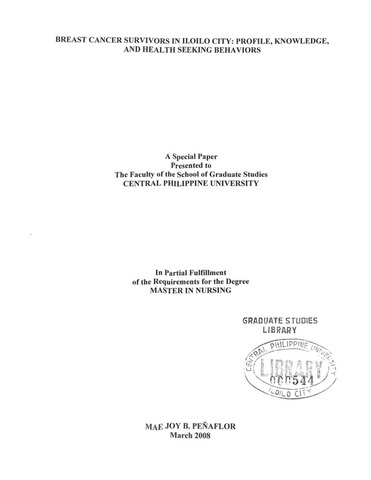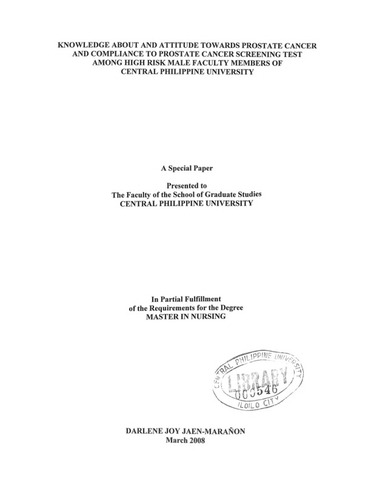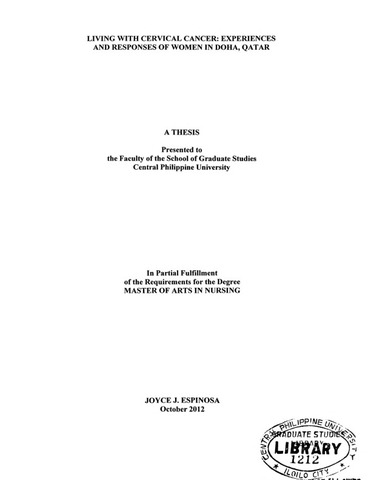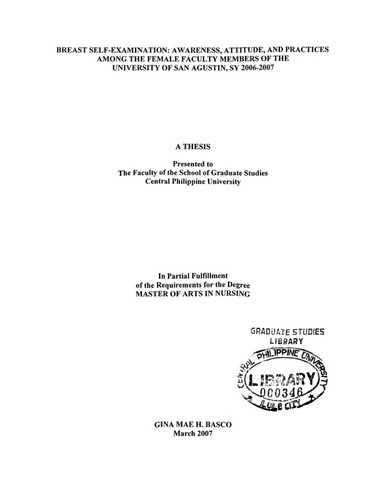Ipakita ang simpleng tala ng item
Breast cancer survivors in Iloilo City: Profile, knowledge, and health seeking behaviors
| dc.contributor.adviser | David, Fely P. | |
| dc.contributor.author | Peñaflor, Mary Joy B. | |
| dc.coverage.spatial | Iloilo | en_US |
| dc.date.accessioned | 2021-02-17T08:07:20Z | |
| dc.date.available | 2021-02-17T08:07:20Z | |
| dc.date.issued | 2008 | |
| dc.identifier.citation | Peñaflor, M. J. B. (2008). Breast cancer survivors in Iloilo City: Profile, knowledge, and health seeking behaviors (Unpublished Master's special paper). Central Philippine University, Jaro, Iloilo City. | en_US |
| dc.identifier.uri | https://hdl.handle.net/20.500.12852/450 | |
| dc.description | Abstract only | en_US |
| dc.description.abstract | This study was conducted to determine the level of knowledge about breast cancer and health seeking behaviors of breast cancer survivors in Iloilo City. The respondents of this investigation were all the 43 breast cancer survivors, who are members of the Bosom Friends Incorporated, Iloilo City. This study is descriptive-correlational which used a one-shot survey. A self-administered instrument was used to collect data and personal interview was done with those who had difficulty in answering the research instrument. Appropriate statistics were used in the analysis of description and relationship using the statistical package for the social science (SPSS). Major Findings 1. The majority of the respondents were married, above 50 years old, and belong to the middle income group. Most of them had attained college education, were employed, and has a family monthly income of 10,000 to 20,000 (Php). Majority had no history of cancer. The mean age was 56.40. 2. In terms of promotive knowledge level about breast cancer, majority ofthem were aware that breast cancer is the most common invasive cancer in women, and other remedies such as herbs and vitamins can assist the body to heal and boost immune system. Furthermore, there were also a high percentage of respondents who maintained the health and well-being in health care. Some of them however, did not know the breast cancer stages. The majority of the respondents had high knowledge level on the preventive aspect of breast cancer. The highest percentage of the respondents knew that engaging in exercise activities may maintain body’s fitness, limiting stress could avoid the growth and proliferation of cancer cells, and that mammography is helpful to identify the breast lump. Regarding the curative aspect, the majority believed that chemotherapy is used to treat advanced or recurrent disease, and that exercise builds strength and boost immune system. In terms of rehabilitative aspect, the majority of the respondents had high knowledge level. All of the respondents believed that spiritual counseling can assist the patient, family members, and caregivers in coping with the demands of care. 3. In terms of promotive level of knowledge, most of them had average level of knowledge, while in the preventive aspect the data reveal that a little more than one-half of them had high level of knowledge. 4. In terms of curative and rehabilitative levels of knowledge, majority of them had average level of knowledge. The findings show that the respondents were more aware of the preventive and rehabilitative aspects of cancer than the other aspects. The overall level of knowledge of the majority was average. 5. In terms of promotive seeking behavior, the majority of the respondents had asked on information about the causes, medical and surgical interventions, and complications of breast cancer. Only some of them had read cancer related information on books, brochures, journals, magazines, leaflets, and updated guidelines that provide new strategies for the prevention and treatment of breast cancer. In the preventive aspect, the majority of the respondents had practice good personal hygiene measures to prevent infection. They also visited the doctor regularly and took multiple vitamins and minerals that aid in healing process. 6. In terms of curative seeking behavior, most of them obtained specific information of the disease process and complied with laboratory test as advice by the physician. They also visited the doctor for signs and symptoms of infection, asked regarding the side effects of the drugs given, following recommendations for surgical management, and subjected themselves for radiation and chemotherapy. 7. In terms of rehabilitative seeking behavior, the majority of them maintained a normal lifestyle that provides a boost in self-esteem. They also acknowledged the need for emotional support from family, friends, and relatives, seek immediate medical care for cancer recurrence, promote positive attitude in dealing and managing the side effects of cancer treatment and attended regular masses for spiritual healing. 8. There is a significant relationship between the respondents’ educational attainment and family history of cancer and their level of knowledge on the promotive aspect of breast cancer. 9. The respondents’ age, civil status, work status, and family monthly income in all aspects are not significantly correlated with their level of knowledge on the promotive, preventive, curative, and rehabilitative aspects of breast cancer. 10. The same findings hold true in health seeking behaviors. The promotive, preventive, curative, and rehabilitative health seeking behaviors are not significantly correlated with the respondents’ age, civil status, educational attainment, work status, family monthly income, and family history of cancer. 11. There is a significant correlation between the level of knowledge on the promotive aspect of breast cancer and promotive and rehabilitative health seeking behaviors. This is indicated by the computed r value of-.023 (p= .885) and .04 (p= .793). No significant correlation, however was noted between the level of knowledge on promotive aspect and preventive and curative health seeking behaviors (r-.176, p=.258 and r. 105, p= 503, respectively). 12. There is no significant correlation between level of knowledge on the preventive aspect of breast cancer and promotive, preventive, curative, and rehabilitative health seeking behaviors (r-.066, p=.672; r-.066, p=.222; r.222, p= 152; and r.23, p=. 128672, respectively). 13. There is a significant correlation between level of knowledge on the curative aspect of breast cancer and promotive and preventive health seeking behaviors (r.044, p= .781 and r.036, p=,818, respectively). No significant correlation, however was noted between level of knowledge on curative aspect and curative and rehabilitative health seeking behaviors (r.278, p=.O71 and r.21, p=.166, respectively). 14. There is a significant correlation between level of knowledge on the rehabilitative aspect of breast cancer and curative health seeking behavior (r.314, p= .041). No significant correlation, however was noted between the level of knowledge on rehabilitative aspect and promotive (r-.074, p= 638), preventive (r.104, p=.508), and rehabilitative (r.18, p=.230) health seeking behaviors. Conclusion In the light of significant findings of the study, the following conclusions were drawn: 1. The respondents were knowledgeable about breast cancer. Most of them believed that spiritual counseling can assist the patient, family members, and caregivers in coping with the demands of care. 2. The cancer survivors had average level of knowledge on the promotive, preventive, curative, and rehabilitative aspects of breast cancer. 3. They practice correct health seeking behaviors. They are interested in relevant information about the disease and at the same time they practice good personal hygienic measures and maintained a normal lifestyle. They are conscious of signs and symptoms of infection so they often consult with their doctor. 4. A significant relationship between the respondents’ educational attainment and family history of cancer and their level of knowledge on the promotive aspect. This indicates that educational attainment and family history of cancer greatly affect their level of knowledge on the promotive aspect of breast cancer. 5. No significant relationship was noted on the level of knowledge on promotive, preventive, curative, and rehabilitative aspects of breast cancer and the respondents’ age, civil status, work status, and family monthly income. 6. No significant relationship was noted on the promotive, preventive, curative, and rehabilitative health seeking behaviors and the respondents’ age, civil status, educational attainment, work status, family monthly income, and family history of cancer. This further denotes that irregardless of respondents’ age, civil status, educational attainment, work status, family monthly income, and family history of cancer, it does not vary with their health seeking behaviors of breast cancer. 7. A significant correlation was noted between the level of knowledge on the promotive aspect of breast cancer and promotive and rehabilitative health seeking behaviors. The findings indicate that the higher the level of knowledge on the promotive aspect of breast cancer, the better their promotive and rehabilitative health seeking behaviors. 8. No significant correlation was noted between level of knowledge on the preventive aspect of breast cancer and promotive, preventive, curative, and rehabilitative health seeking behaviors. This indicates that the level of knowledge on the promotive aspect has no significant bearing in all aspect of health seeking behaviors. 9. A significant correlation was noted between level of knowledge on the curative aspect of breast cancer and promotive and preventive health seeking behaviors. The findings indicate that the higher the level of knowledge on the curative aspect of breast cancer, the better their promotive and preventive health seeking behaviors. 10. A significant correlation between level of knowledge on the rehabilitative aspect of breast cancer and curative health seeking behavior. The findings indicate that the higher the level of knowledge on the rehabilitative aspect of breast cancer, the better their curative health seeking behavior. Recommendations Based on the results of the study, the researcher presents the following recommendations: Breast Cancer Survivors. The breast cancer survivors should have adequate breast cancer information and accurate heath seeking behaviors to improve their health condition and improve their quality of life since they are also responsible for their own health. The family and relatives should provide adequate support to improve comfort level and quality of life in caring for breast cancer patients. Department of Health. The Department of Health should intensify further their information dissemination in the promotion, prevention, curative and rehabilitative aspects of care of breast cancer patient. It is further recommended that health education and prevention programs of breast cancer should be sustained and strengthened. Cancer Specialists. This study will focus the physician to effectively attend to the physical and emotional needs of the patient with advanced cancer and should also emphasize improving the comfort of the patient and satisfaction, reducing unnecessary hospitalizations, and managing patient care across the advanced disease trajectory. To provide this support, a partnership and collaboration must be developed between health professionals and family caregivers around the patients’ plan of care. Health Educators, Nurses, and Nursing Students. Health educators play a vital role in disseminating accurate information and correct practices that may help in reducing the incidence of breast cancer. Further, it is recommended that they may also help in planning, implementing, maintaining, and evaluating the programs of the Department of Health. The nursing students should also help in disseminating, continue information campaign, and giving of correct health teachings about breast cancer. Future Research. This will serve as a basis for future studies similar to this study so that eventually new methods may be created in order to ameliorate the plight of the suffering of breast cancer patients. | en_US |
| dc.format.extent | xix, 110 leaves | en_US |
| dc.language.iso | en | en_US |
| dc.subject.ddc | GSL Theses 610.73072 P37 | en_US |
| dc.subject.lcsh | Breast--Cancer | en_US |
| dc.subject.lcsh | Breast--Cancer--Patients | en_US |
| dc.subject.lcsh | Cancer--Patients | en_US |
| dc.subject.lcsh | Health behavior | en_US |
| dc.subject.lcsh | Breast--Cancer--Psychological aspects | en_US |
| dc.subject.lcsh | Philippines--Iloilo | en_US |
| dc.subject.mesh | Breast Cancer Lymphedema | en_US |
| dc.subject.mesh | Cancer Survivors | en |
| dc.subject.mesh | Health Knowledge, Attitudes, Practice | en |
| dc.title | Breast cancer survivors in Iloilo City: Profile, knowledge, and health seeking behaviors | en_US |
| dc.type | Special paper | en_US |
| dc.description.bibliographicalreferences | Includes bibliographic references | en_US |
| dc.contributor.committeemember | Lamasan, Nelida L. | |
| dc.contributor.committeemember | Yoro, Carolyn L. | |
| dc.contributor.committeemember | Gilongos, Annalie D. | |
| dc.contributor.department | School of Graduate Studies | en_US |
| dc.description.degree | Master in Nursing | en_US |
Mga file sa item na ito
Lumilitaw ang item na ito sa mga sumusunod na (mga) Koleksyon
-
Master in Nursing [37]





